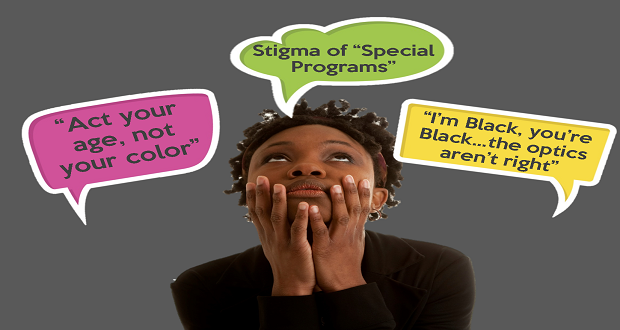
I don’t often use this venue to talk about my own diversity and inclusion journey. However as I started to dig deeper into this idea of stereotype threats, I began to reflect on how stereotype threats about my identity group have impacted me over the years. I identify as a heterosexual African American, Baby Boomer woman. While I have many more identities (we all have multiple identities), these are the ones that, for me, most define who I am. Having said that, most of us are aware of the stereotypes that come with each of these identities. I want to explore some of them in the context of stereotype threats.
“Act Your Age Not Your Color”
From early childhood, the stereotype threat that most resonates with me is act your age, not your color. This was a common admonishment from my parents and relatives if I was misbehaving. The types of behaviors on my part that usually elicited the act your age, not your color response included talking too loudly, jumping around in childish dance motions or engaging in what I will call “girly giggles” with my friends.
There was a strong belief in my household that you should never behave in a way that would associate you with the typical stereotypes about African Americans. My mother actually went to the extreme of not even allowing me to play with with certain African Americans in our neighborhood for fear that I would be labeled as they were (rowdy, commonly used slang, teen pregnancies, “thuggish”). I remember that one of my friends in high school fit the stereotypes that she was so adamant about avoiding. Angela was one of the sweetest girls. She lived on the “wrong side of town” (according to my mother) and had “thuggish” brothers who were up to no good. Angela was accidentally killed by a gun belonging to one of her brothers in our senior year of high school. Of course you can imagine that my mother had a lot of “I told you so’s” for me. I was devastated and to this day remember her fondly. Angela was not a stereotype. She was just a teenager with a big heart who had dreams of doing great things with her life.
Stigma of “Special Programs”
The next time that a stereotype threat surfaced for me was my freshman year at college at the University of Rochester. At the time there were about 3000 undergraduates of whom 69 were African American. The year prior, there were only 10 black students enrolled in undergraduate programs. The University was under affirmative action pressure to admit more students of color. They established a special program called EOP (Equal Opportunity Program) to support these “special admits” as they were called. I knew nothing of this program because I was a “regular admit”. However, all of my professors assumed that I was a part of this EOP program. I learned pretty quickly that it was not a good thing to be associated with the “special admits”. You were absolutely treated differently. The underlying assumption was you do not belong here. We are simply tolerating you because we have to. Once I clarified that I was not an EOP student, I was viewed in a very different light; there were higher expectations for my performance; more respect.
The stigma of being associated with special programs also plays out in the work world. People of color have admitted that they would not join the affinity group established for their identity because they were afraid of how it would look to their peers and superiors. Again, this advances the idea of needing to disassociate yourself from programs and activities that might perpetuate stereotypes about your group and therefore about you.
“I’m Black, You’re Black…The Optics Aren’t Right”
Early in the history of The Winters Group, I was presenting a proposal to do some work for a very large corporation. My potential client was an African American male. He told me very candidly that he would likely not select The Winters Group, even though we had the skills to complete the assignment. He said it is just too risky. The optics are not right. He did not want to be accused of selecting my company because of our common racial identity.
I also see this in hiring decisions. I have heard leaders of color lament that they have to be careful not to be perceived as hiring too many people of their same race, perpetuating a stereotype that “we” all stick together.
Stereotype threats are real and I don’t think we have examined them enough from the workplace perspective. I would love to hear from you about how stereotype threats have impacted you.


















